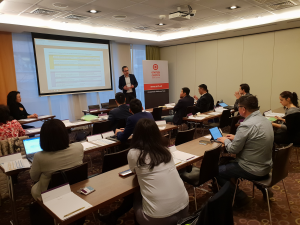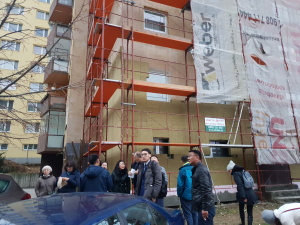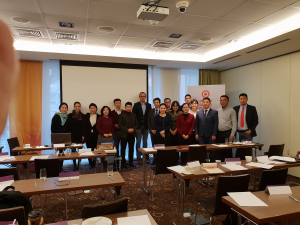Bratislava, December 7-8 – The Government Delegation from Ulaanbaatar Mayor’s Office, the Energy Regulatory Commission, the Ministry of Construction and Urban Development and the High Council on Home Owners’ Association visited Energy Centre of Bratislava to learn Slovakia’s experience on renovating its public and residential buildings through market mechanisms and government support. This knowledge exchange event was jointly organized by Mayor’s Office of Ulaanbaatar City, the Global Green Growth Institute (GGGI) and the United Nations Development Programme (UNDP).
“What Slovakia experienced 30 years ago in its effort to develop energy service markets echoes the current issues Mongolia, particularly Ulaanbaatar City, is now facing. This knowledge exchange event provided invaluable vision and a practical roadmap to develop enabling policy and legislative environment for energy services markets” said Head of Engineering Division Kherlen Turtogtokh.
Mongolia has one of the lowest heat and power tariffs in the region significantly lower than production cost. The same is true for heat provision and production. Consumption-based billing practice for residential and public buildings users does not exist. Consequently, a heavily subsidized tariff is the main impediment to the development of energy services markets. It is equally important for Mongolia to develop and implement a structured roadmap and action plan to improve and revise its laws and regulations, such as allowing the sharing of energy savings participatory project development, and consumption-based heat billing.
During the program, participants had constructive dialogues with high-level government officials and representatives of research institutes, non-governmental organizations (NGO), and sectoral associations, namely the Energy Centre Bratislava, the Ministry of Transport and Construction of Slovakia, the Building Testing and Research Institute, the Building Savings Bank, the Buildings for the Future NGO, the Association for Better Management of Residential Buildings, and the Association of Energy Service Providers. In addition, delegates visited successful ESCO projects for the retrofitting of residential buildings, led by Building Savings Bank, and public building renovation, led by ENGIE, an energy services company.
The Ulaanbaatar City Mayor’s Office has partnered with GGGI to develop a project for energy efficient residential retrofitting project, in order to contribute to its climate change mitigation target to reduce building heat loss by 20% by 2020 and 40% by 2030, captured in Mongolia’s Nationally Determined Contribution to the Paris Agreement. According to an analysis by UB City’s Mayor’s Office, if the city’s 1077 soviet-style, pre-cast panel buildings blocks were retrofitted, it would help save up to 82,053 kWh per annum which equals the heat production capacity of Combined Heat and Power Plant No 2. Due to limited fiscal resources, Ulaanbaatar City is seeking innovative ways to finance and fund the retrofitting projects, such as mobilizing international donor grants and concessional loans, contributing to its own resources in order to attract private sector participation and introducing elements from energy performance contracting, with a hope to trigger market transformation in the energy sector.
As an immediate follow-up to this knowledge exchange event, Ulaanbaatar City along with key national ministries and institutions, representatives of the private sector, utility companies and residents, will conduct an open dialogue and discussion to develop a practical roadmap for developing energy services markets in the building sector as well as to bring together concern and solutions from key stakeholders to the proposed project preparation in the residential building sector.
Delegates also expressed that they will apply and share the acquired knowledge and best practices to enhance the pipeline of bankable projects in UB City. GGGI, the UNDP and the delegates wish to acknowledge and thank the Energy Centre Bratislava for hosting the delegation and developing such an informative and practical event.


